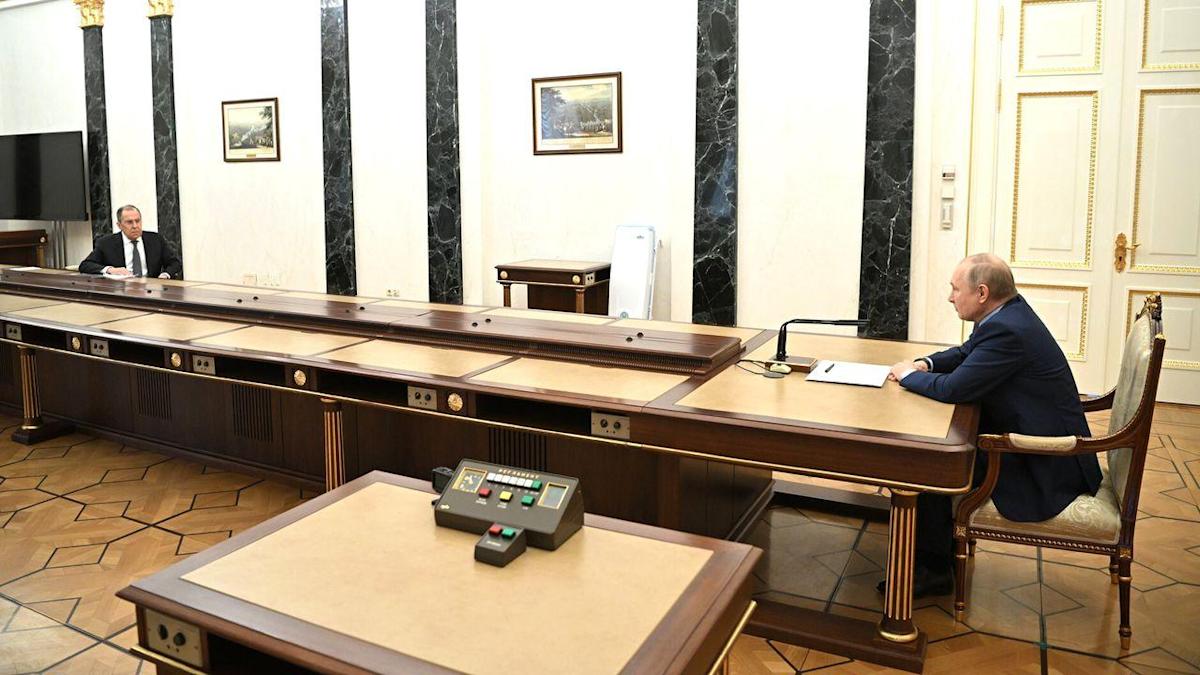
The U.S. is relocating its embassy operations from Kyiv to Lviv in western Ukraine due to fears of a Russian invasion that U.S. officials believe could begin within the next 48 hours.
The other side: That announcement contrasted sharply with the scenes in Moscow on Monday as top Russian officials briefed Vladimir Putin in carefully choreographed meetings that diplomacy will continue and military exercises near the border will wind down.
Stay on top of the latest market trends and economic insights with Axios Markets. Subscribe for free
-
Foreign Minister Sergey Lavrov told Putin that Moscow’s Western interlocutors had shown a “willingness to enter into serious negotiations” and “a way forward” could still be found, though talks must not continue indefinitely without results.
-
Defense Minister Sergei Shoigu, who like Lavrov briefed Putin from the far end of an enormous table, said some military exercises had concluded while others would soon wrap up.
-
However, experts tracking Russia’s military movements report that more military units have continued to arrive near the border. State Department spokesperson Ned Price said the U.S. had yet to see “anything resembling de-escalation.”
The big picture: Russia appears to now have all the pieces in place to conduct a full-scale invasion.
-
The question remains whether that buildup is engineered primarily to intimidate or topple the government in Kyiv, or to force the U.S. and its allies to seriously reckon with Russia’s security demands in Europe.
State of play: In addition to the embassy move, the U.S. is urging all Americans still in Kyiv to get out. U.S. officials continue to insist an invasion could begin at any time and have reportedly pinpointed Wednesday as the possible launch date.
-
The Biden administration has been so forward-leaning in issuing warnings in part out of a hope that calling out Putin’s plays ahead of time will deny him a pretext for invasion.
-
Yes, but: They’ve acknowledged that they don’t know whether Putin has made a final decision.
European leaders are searching for a diplomatic off-ramp that has remained elusive up to now.
-
German Chancellor Olaf Scholz is visiting Kyiv today and Moscow tomorrow, following French President Emmanuel Macron’s trips last week. Scholz’s aides say he’s seeking to better understand Putin’s intentions but doesn’t expect a breakthrough.
-
Between the lines: Some in Washington are suspicious of Macron’s diplomatic ambitions and Scholz’s relative dovishness on sanctions and arming Ukraine, but they may be better positioned than Biden to find a diplomatic formula that allows Putin to save face while pulling back from the brink.
Russian officials continue to accuse the U.S. of fear-mongering and deny any intention to invade.
-
Lavrov lamented Saturday, following a call with Secretary of State Tony Blinken, that if Russia pulls its troops back (as he claims was always the intention), it will be heralded in the West as a “diplomatic victory.”
-
Putin’s timeline remains uncertain. Michael Kofman of CNA expects a “go/no go decision this week,” while Richard Haass of the Council on Foreign Relations contends Putin could plausibly extend the crisis indefinitely by leaving troops near the border.
Ukrainian President Volodymyr Zelensky continues to caution that panic only plays into Putin’s hands.
-
He said today that his family will remain with him in the capital, that Western diplomats should stay in Kyiv, and that oligarchs who fled the country should return.
What to watch: Finance ministers from the G7 countries vowed today that Russia would face “massive and immediate” economic consequences if it invades.
-
But for now, it’s Ukraine’s economy that’s getting hit hardest by the threat of war, and several major airlines are avoiding Ukrainian airspace.
-
While the streets of Kyiv appear calm, residents are making contingency plans to flee or fight, FP’s Amy Mackinnon reports.
Like this article? Get more from Axios and subscribe to Axios Markets for free.




